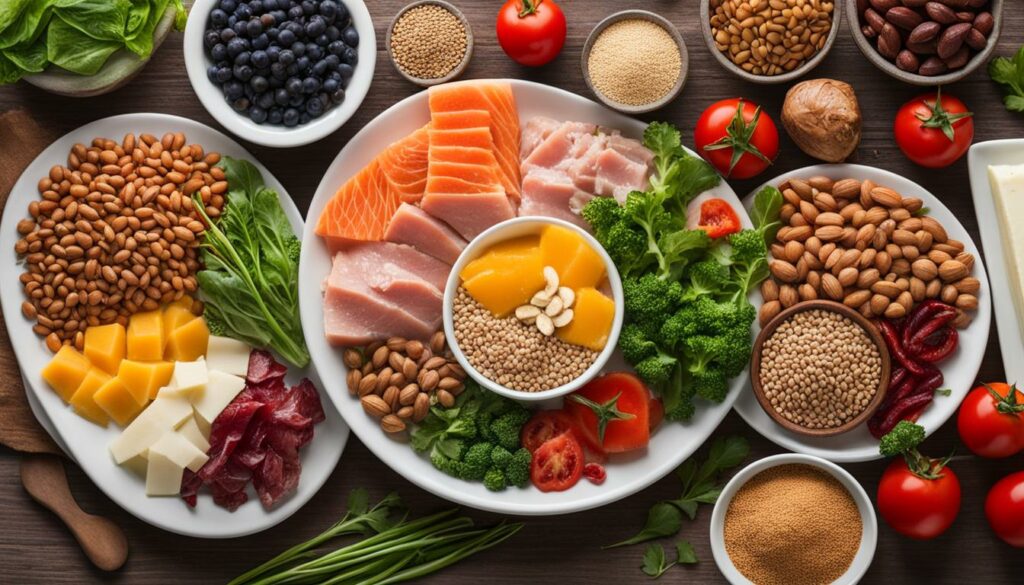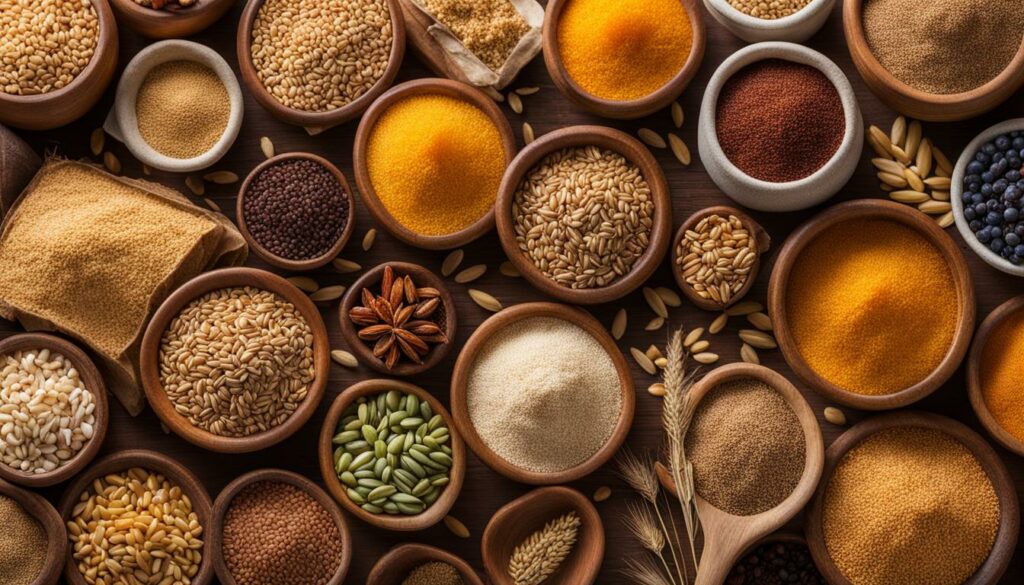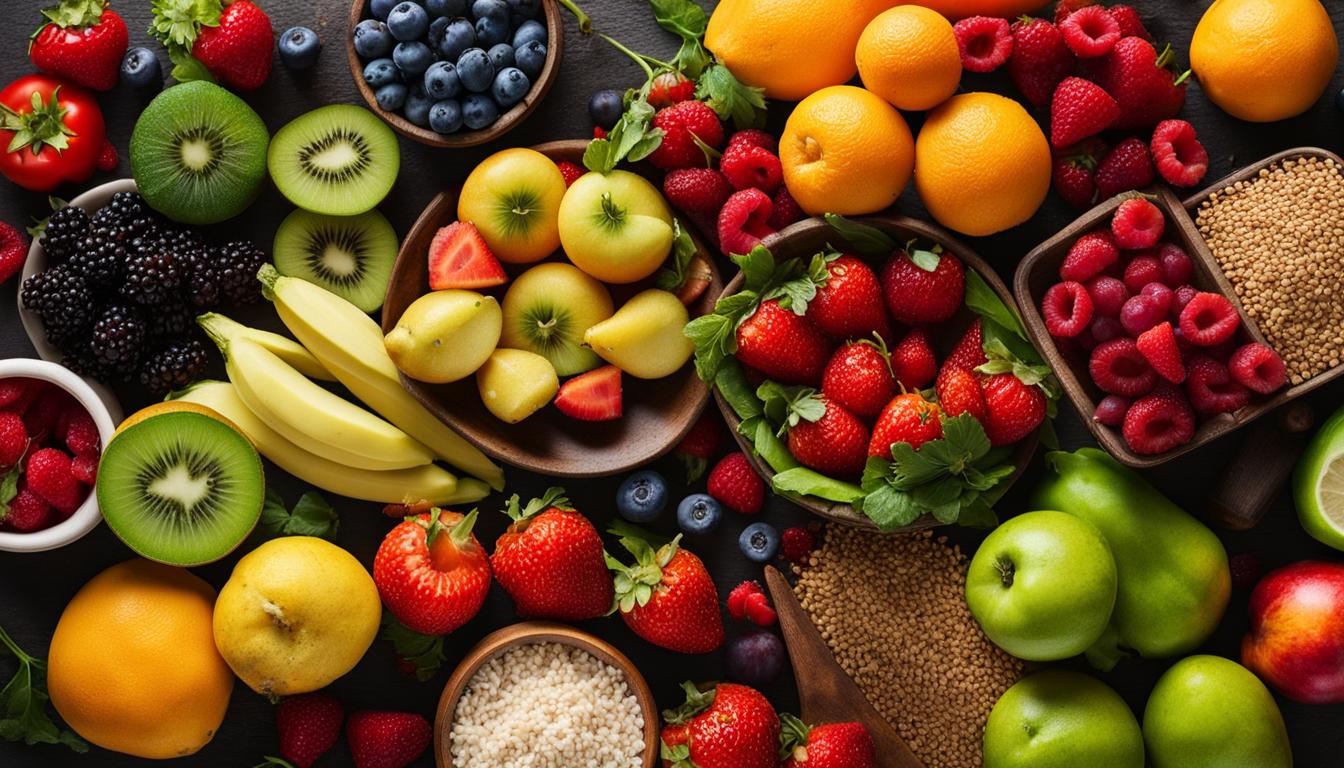Welcome to capturediet.com, where we value the importance of a balanced diet in achieving optimal health. Eating well-balanced meals that are rich in nutrients is essential for maintaining a healthy lifestyle. While the term “balanced diet” can seem vague, it refers to consuming a variety of foods from different food groups to provide the body with the necessary nutrients it needs.
A balanced diet is not just about eating healthy foods, but also about consuming appropriate portions of each food group to ensure that you are getting the right proportion of nutrients. By including nutrient-rich foods in your meals, you can help to maintain your ideal health.
Key Takeaways:
- A balanced diet is essential for optimal health.
- A well-balanced meal should include a variety of foods from different food groups.
- Portion control is important when consuming each food group.
- Nutrient-rich foods should be a priority in your balanced diet.
- Following dietary guidelines can help to ensure that you maintain a balanced diet.
Understanding Nutrition for a Balanced Diet
Nutrition is a fundamental aspect of maintaining a balanced diet, and it involves consuming the necessary essential nutrients that promote overall health. These nutrients include carbohydrates, proteins, fats, vitamins, and minerals. To achieve a well-balanced diet, it is crucial to understand the role that each nutrient plays and how to incorporate them in our daily meals.
Carbohydrates are the primary source of energy for the body, and they provide the necessary fuel for our physical and mental activities. It is important to choose nutrient-rich carbohydrates such as whole grains, fruits, and vegetables, rather than refined carbohydrates, which lack essential fiber and nutrients.
Proteins are essential for building and repairing tissues in the body, and they play a crucial role in maintaining a healthy immune system. Good sources of protein include lean meats, fish, beans, and nuts.
Fats are necessary for the body to function correctly, but it is important to consume healthy fats such as those found in nuts, avocados, and olive oil. These fats can help reduce the risk of heart disease and improve brain function.
The recommended dietary guidelines suggest that a healthy, well-balanced meal should include a variety of nutrient-rich foods. These guidelines can help achieve optimal health by providing the body with the necessary vitamins and minerals it needs to function correctly.
At CaptureDiet, we believe that a healthy diet is essential for a healthy lifestyle. Our nutritionists recommend well-balanced meals that incorporate a variety of essential nutrients. Understanding nutrition is the first step towards achieving a balanced diet and making informed choices for optimal health.
Building a Balanced Plate: Food Groups and Portion Control
As we talked about in the previous section, a balanced diet is essential for overall well-being. Building a balanced plate requires incorporating foods from different food groups while considering portion control. This practice ensures that we consume the necessary nutrients for a healthy lifestyle.
There are five food groups that we must include in our meals to achieve a well-balanced diet: vegetables, fruits, grains, proteins, and dairy. Each of these groups provides a unique set of nutrients that we need to sustain optimal health.
Portion control is also essential to create well-balanced meals. It involves understanding how much of each food group we should consume. Larger portions can lead to overeating, which can result in weight gain and other health problems.
One useful tool for portion control is the “MyPlate” method developed by the USDA, which represents the five food groups in a visual guide. It divides the plate into different sections, indicating the recommended portion sizes of each food group for a healthy meal.
MyPlate Recommendations:
| Food Group | Recommended Portion Size |
|---|---|
| Vegetables | 2-3 cups |
| Fruits | 1.5 – 2 cups |
| Grains | 6-8 ounces |
| Proteins | 5-7 ounces |
| Dairy | 3 cups |
By following the MyPlate method, we can create balanced meals that contain the necessary nutrients from each food group in appropriate portion sizes.
Building a balanced plate may seem overwhelming at first, but it’s achievable with small, incremental changes. By prioritizing nutrient-rich foods and practicing portion control, you can develop healthy eating habits that will contribute to a well-balanced diet and a healthy lifestyle.
The Importance of Fruits and Vegetables in a Balanced Diet
Fruits and vegetables are essential components of a balanced diet. They provide a plethora of essential nutrients, vitamins, and minerals that promote overall health and reduce the risk of chronic diseases. Consuming a variety of fruits and vegetables ensures that your body receives a wide range of nutrients and fiber, critical for proper digestion and gut health.
At capturediet.com, we recommend incorporating fruits and vegetables into every meal to maximize their nutritional benefits.
| Fruits | Vegetables |
|---|---|
| Apples | Spinach |
| Bananas | Broccoli |
| Mangoes | Sweet Potatoes |
| Oranges | Carrots |
| Kiwi | Bell Peppers |
These foods are rich in antioxidants, vitamins A, C, E, and K, and fiber. A colorful plate consisting of greens, yellows, oranges, and reds not only makes the meal visually appealing but also increases the diversity of nutrients.
Incorporating a variety of fruits and vegetables into your diet can be easy and fun. Here are a few tips to help:
- Add slices of fruit to your cereal or oatmeal in the morning.
- Include a side salad with your lunch or dinner.
- Choose fruit over processed snacks for a mid-day pick-me-up.
- Roast vegetables as a side dish or add them to soups and stews.
- Keep a bowl of fresh fruit on the counter for a quick, healthy snack.
By following these tips and incorporating fruits and vegetables into your meals, you can reap the nutritional benefits and support a healthy lifestyle.
Including Protein in Your Balanced Diet
Protein is a crucial building block for our bodies, with numerous essential functions. It aids in repairing and growing tissue, building muscles, and producing enzymes and hormones. Therefore, it is essential to include protein in your balanced diet to support your body’s needs. Consuming enough protein also helps you feel full for longer, reducing the likelihood of snacking on unhealthy foods.
There are numerous protein sources, including meat, poultry, fish, eggs, cheese, and plant-based options such as beans, lentils, and nuts. It is crucial to choose lean proteins that provide the most nutritional benefits. Lean poultry, such as turkey or chicken, and fatty fish like salmon or tuna, are excellent sources of protein with high nutritional value. Vegetarian proteins such as tofu, tempeh, and quinoa are valuable options, especially for those following a vegan or vegetarian diet.
| Foods | Protein (g) | Calories (kcal) |
|---|---|---|
| Chicken breast | 31 | 110 |
| Tuna | 30 | 116 |
| Salmon | 27 | 182 |
| Greek yogurt | 10 | 60 |
| Lentils | 9 | 116 |
| Almonds | 21 | 579 |
By including protein in your balanced diet, you will experience numerous nutritional benefits. Consuming enough protein helps build and repair muscles, reduces appetite, and boosts metabolism. Protein also helps regulate blood sugar levels and lowers blood pressure.
It is essential to find a balance between protein and other food groups in your meals. Try pairing lean proteins with vegetables and whole grains to create well-rounded, nutrient-rich meals. Experiment with vegetarian and vegan protein sources to find what works best for you.
Capturediet.com emphasizes the significance of protein for a balanced diet. Check their website for more information about nutrition and healthy eating habits.

Healthy Fats and Carbohydrates for a Balanced Diet
When it comes to maintaining a balanced diet, it’s important to include healthy fats and carbohydrates. However, not all fats and carbs are created equal, and it’s essential to make wise choices to ensure that you are fueling your body with nutrient-rich foods.
The Role of Healthy Fats
Healthy fats are critical for optimal health and are an essential part of a well-rounded diet. They provide essential fatty acids that our bodies need but cannot produce on their own. Healthy fats also help to absorb certain vitamins and minerals and to maintain healthy skin and hair.
It’s essential to include healthy fats in your diet, such as:
| Food Sources | Healthy Fats |
|---|---|
| Fatty fish (salmon, tuna, sardines) | Omega-3 fatty acids |
| Nuts and seeds (almonds, chia seeds, flaxseed, walnuts) | Monounsaturated and polyunsaturated fats |
| Avocado | Monounsaturated fat |
| Olive oil | Monounsaturated fat |
While healthy fats are an important part of a balanced diet, it’s essential to moderate your intake and choose healthy sources.
The Role of Carbohydrates
Carbohydrates are the primary source of energy for our bodies, and they should be a part of a healthy diet. However, not all carbohydrates are created equal, and it’s crucial to choose complex carbs over simple carbs to get the most nutritional benefits.
Complex carbohydrates take longer to break down and provide a steady source of energy, while simple carbohydrates provide a quick burst of energy but can lead to blood sugar spikes and crashes.
Healthy sources of carbohydrates include:
- Whole grains (brown rice, quinoa, whole-wheat bread)
- Legumes (beans, lentils, peas)
- Fruits (apples, berries, oranges)
- Vegetables (broccoli, spinach, sweet potatoes)
It’s essential to include carbohydrates in your diet, but the key is to choose complex carbohydrates and moderate your intake to support overall health.
Remember that a balanced diet should include healthy fats and complex carbohydrates in moderation to ensure optimal health.
The Role of Whole Grains in a Balanced Diet
Whole grains are an essential element of a well-balanced diet and offer a range of essential nutrients that can boost overall health. As a source of dietary fiber, whole grains promote good digestion, lower cholesterol levels, and regulate blood sugar levels.
Whole grains also contain essential vitamins and minerals such as magnesium, which supports bone health, and iron, which aids in healthy blood flow. Incorporating whole grains into your daily diet can help maintain a healthy weight, lower the risk of heart disease, and reduce the likelihood of developing type 2 diabetes.
| Whole Grain | Nutrition Benefits |
|---|---|
| Brown Rice | High in magnesium and fiber, supports heart health |
| Oatmeal | Contains beta-glucan fiber, supports healthy cholesterol levels |
| Quinoa | Complete protein source, high in fiber and iron |
When shopping for whole grain products, be sure to check the ingredient list to ensure you’re getting the real deal. Look for products that list whole grains as the first ingredient, such as whole wheat bread. Other options include brown rice, quinoa, and oatmeal.

Incorporating whole grains into your meals is easy and delicious. Swap out white rice for brown rice, select 100% whole wheat bread, or use mixed quinoa in place of traditional rice in your next meal. By choosing nutrient-rich whole grains, you’re making a commitment to a healthy lifestyle and a well-rounded, balanced diet.
Meal Planning for a Balanced Diet
Meal planning is an effective tool for maintaining a balanced diet and leading a healthy lifestyle. At capturediet.com, we understand the importance of planning meals that provide the necessary nutrients to support your body’s needs.
One of the biggest benefits of meal planning is that it helps you stay on track with your nutrition goals. By planning your meals in advance, you can ensure that you are incorporating a variety of healthy foods into your diet, including fruits, vegetables, lean proteins, and whole grains.
To start, set aside some time each week to plan out your meals and snacks. Consider your schedule for the week to identify any days when you may need to prepare meals in advance or eat on the go. This can help you make choices that align with your goals, even when you’re short on time.
Next, create a shopping list based on your meal plan to ensure that you have all the necessary ingredients on hand. This can save time, reduce food waste, and keep you from making impulsive choices at the grocery store.
Remember to prioritize balanced meals that include a mix of protein, carbohydrates, and healthy fats. Invest in meal prep containers to help you portion out your meals in advance, and consider batch cooking recipes to save time and streamline the meal planning process.
With a bit of time and effort, meal planning can become a regular part of your routine, ensuring that you are consistently meeting your nutritional needs. At capturediet.com, we believe that meal planning is an essential aspect of a healthy lifestyle.
Conclusion
In conclusion, a balanced diet is essential for maintaining a healthy lifestyle and achieving optimal health. By incorporating the key components of a balanced diet, such as nutrient-rich foods, proper portion control, and meal planning, you can make informed choices to support your body’s needs.
At capturediet.com, we believe that a balanced diet is not only crucial for physical health but also for mental and emotional well-being. It can improve energy levels, enhance mood, and prevent chronic diseases.
Remember, a healthy lifestyle is a journey, and it requires consistency and mindfulness. Prioritize your health by making conscious choices about what you eat, how much you eat, and how you plan your meals.
Thank you for reading this article on balanced diet essentials for optimal health. We hope that it has been informative and helpful in your pursuit of a healthy lifestyle.
FAQ
What is a balanced diet?
A balanced diet is one that includes a variety of nutrient-rich foods from all the major food groups in the right proportions. It provides the body with essential nutrients, such as vitamins, minerals, protein, carbohydrates, and healthy fats, to support optimal health.
Why is a balanced diet important for optimal health?
A balanced diet is crucial for optimal health because it provides the body with the necessary nutrients to function properly. It helps prevent nutritional deficiencies, supports a healthy weight, boosts energy levels, strengthens the immune system, and reduces the risk of chronic diseases.
What are the key components of a balanced diet?
The key components of a balanced diet include fruits, vegetables, whole grains, lean proteins, healthy fats, and low-fat dairy products. These food groups provide essential nutrients and should be consumed in appropriate portions to achieve a balanced diet.
How can I incorporate a balanced diet into my daily meals?
Incorporating a balanced diet into your daily meals involves planning and portion control. Focus on including foods from all the major food groups in each meal, such as filling half of your plate with fruits and vegetables, choosing whole grains, incorporating lean proteins, and adding healthy fats in moderation.
How can I practice portion control for a balanced diet?
Practicing portion control means eating the right amount of each food group. You can use visual cues, such as measuring cups or your hand size, to estimate appropriate portion sizes. Also, be mindful of your hunger and fullness cues to avoid overeating.
Can I achieve a balanced diet without eating fruits and vegetables?
Fruits and vegetables are important sources of vitamins, minerals, fiber, and antioxidants. While you can still achieve a balanced diet without them, it is recommended to include a variety of fruits and vegetables to ensure you are obtaining all the necessary nutrients for optimal health.
How much protein should I consume in a balanced diet?
The recommended daily protein intake varies depending on factors such as age, sex, and activity level. As a general guideline, aim to consume about 0.8 grams of protein per kilogram of body weight. Good sources of protein include lean meats, poultry, fish, tofu, legumes, and dairy products.
Can carbohydrates be part of a balanced diet?
Carbohydrates are an important source of energy and can be part of a balanced diet. Focus on consuming complex carbohydrates, such as whole grains, legumes, and fruits, which provide fiber, vitamins, and minerals. Limit your intake of refined carbohydrates, such as sugary snacks and white bread, to maintain a balanced diet.
How can I plan meals for a balanced diet?
Meal planning can help you achieve a balanced diet. Start by making a list of nutritious foods you enjoy from each food group. Plan your meals ahead of time, incorporating a variety of foods and ensuring adequate portion sizes. Consider prepping meals and snacks in advance to make healthy eating more convenient.
What are the benefits of maintaining a balanced diet?
Maintaining a balanced diet offers numerous benefits, including improved energy levels, enhanced weight management, reduced risk of chronic diseases, stronger immune function, better digestion, and overall well-being. It supports an active and healthy lifestyle, enabling you to perform your best in daily activities.

